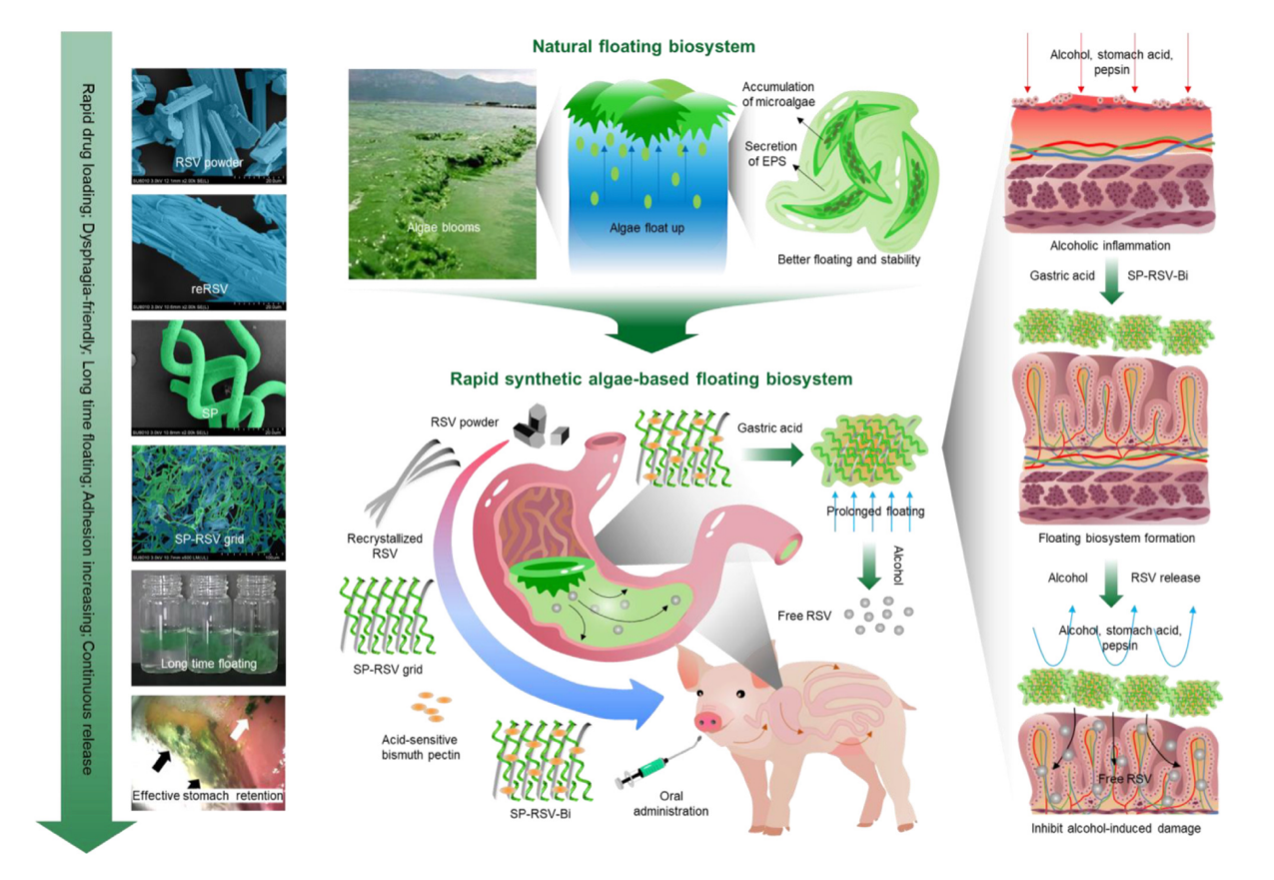Contemporarily, the fast-paced society made people live under huge stress. Irregular eating habits and excessive drinking are common, causing frequent complaints of stomachache, bloating, and acid reflux. These symptoms often indicate the presence of underlying stomach diseases. China is a nation plagued by stomach disease. According to statistics, the incidence of gastric diseases in China is as high as 85%. A healthy stomach acts like a food grinder, secreting strong acidic gastric juices. However, an overproduction of hydrochloric acid or excessive activity of gastric enzymes can damage the stomach lining, leading to gastritis and gastric ulcers.
Oral drug delivery is considered the preferred route of drug administration due to its safety, non-invasiveness, low cost, high patient compliance, and benefits regarding targeted or localized therapy, such as the treatment of diabetes and gastric diseases. However, gastric emptying limits the retention and absorption of drugs in the stomach, and the acidic environment and proteases may also affect the activity of drugs, especially for biological products. To retain drugs in the stomach, strategies such as increasing adhesion, changing shape, using microneedles, and generating buoyancy have been used, as exemplified by the “floating systems” for diltiazem, verapamil, and others. These floating systems can decrease their density by swelling or producing gas, which promotes their flotation in gastric juice. Compared to other strategies, flotation systems have been well developed and widely used in the clinic, but they are mainly designed as tablets to carry drugs and maintain buoyancy, which are not friendly to patients with dysphagia, and the swelling or gas produced by tablets in the stomach may cause indigestion and even aggravate gastric diseases.
Spirulina has been widely used in the field of food and health food, and its safety has been unanimously recognized in domestic and overseas. In addition, spirulina is rich in alkaline ions such as potassium and sodium, which can directly neutralize gastric acid and inhibit pepsin to reduce the occurrence of gastric ulcers, and is also rich in chlorophyll a, γ-linolenic acid, antioxidants β-carotene, dismutase SOD and phycocyanin and other good anti-ulcer factors. The comprehensive effect of these factors has obvious auxiliary effects on gastritis and gastric ulcers. A large number of clinical trials in domestic and overseas have shown that spirulina consumption has a certain protective effect on gastric diseases, and has good application potential in the design of gastric delivery system.
Recently, Professor Min Zhou's team from the Second Affiliated Hospital of Zhejiang University School of Medicine/Zhejiang University-University of Edinburgh Institute published a research paper titled Natural floating biosystem for oral induced diseases in the Matter (the Cell sister journal), making new progress in the design of oral gastric delivery systems.
This research has developed a novel oral drug delivery strategy based on spirulina, which utilizes a spirulina biological floating system to load drugs and improve their gastric retention time. While ensuring safety, it significantly improves the therapeutic effect of drugs on gastric diseases. Good results have been achieved in mouse acute and chronic models and pig animal models, and it is expected to be applied to the treatment of various gastric diseases and the delivery of special drugs that require absorption through the stomach.
Before this, various microbial drug carriers (such as bacteria, blood cells, and microalgae) have gained considerable interest because of their special biological functions. However, the current studies on microbial carriers mostly focus on intravenous or intestinal delivery, and few have been reported for large-scale production. The possible reasons are as follows:
(1) gastric emptying makes it difficult for these microbial systems to remain in the stomach, and the acidic environment and proteases may rapidly disrupt their bioactivity;
(2) the traditional drug-loading process needs to incubate the microorganism with a high concentration of the drug for a long time, which may affect the activity of microalgae, especially for water-insoluble drugs, which require organic solvents that are mostly toxic;
(3) special modification or multi-step processing of microorganisms will increase the cost, make production more difficult, and reduce the advantages of the microorganisms as natural drug carriers.
Under appropriate conditions, algae in the water will grow rapidly and then accumulate, float, cover the surface of the water, and eventually cause algal blooms. As a natural micron-sized floating system, floatable microalgae are low-cost and dysphagia-friendly, and most of them have beneficial biological components (such as phycocyanin and spirulina polysaccharides), which show great application potential to overcome the above problems of gastric floating tablets.
To challenge the above dilemmas, we mimic the formation of algal blooms, use the spatial structure between microalgae for rapid drug loading, and add gastric-acid-sensitive bismuth pectin instead of EPS to promote the accumulation of microalgae.
Based on RSV and Spirulina platensis (S. platensis [SP], a kind of floatable microalgae with a special structure), here we design a grid-like drug-loading system. With the help of the long strip structure of RSV after recrystallization and the natural long helical structure of spirulina, the SP-based RSV loading system (SP-RSV) can be quickly obtained by simple mixing, which does not affect the bioactivity of microalgae and is suitable for large-scale production. Through the spatial grid structure formed between RSV and SP, almost all the RSV can be evenly dispersed throughout the SP and further float in gastric juice by the buoyancy of SP. In addition, bismuth pectin has been reported to interact with mucin and aggregate rapidly in the stomach acidic environment, which may enhance the adhesion of drugs and provide some protection for the stomach from alcohol. The combination of bismuth pectin (which gelatinizes rapidly upon contact with gastric juice) with SP-RSV (SP-RSV-Bi) can effectively prolong the floating time of SP-RSV in gastric juice while increasing its adhesion, both of which help SP-RSV to reside in the stomach for a long time, and finally release RSV rapidly after exposure to alcohol.
In mice with acute or chronic alcohol injury models, the SP based floating system can stay in the stomach for a long time, better alleviating alcohol-induced gastrointestinal injury and alcoholic liver symptoms. In addition to the mouse models, we evaluate the therapeutic effects of this floating system in piglet models where the gastrointestinal tract is more similar to that of humans. Through gastroscopy, it is observed that the system can accumulate and float effectively in the stomach of piglet, and the retention time of stomach is greatly prolonged. In both mouse and piglet models, this biosystem can float in the stomach effectively, and its therapeutic efficacy and safety are also demonstrated, indicating its promising clinical application.

Dr. Shiyuan Hua from the Min Zhou team at the Zhejiang University-University of Edinburgh Institute (ZJU-UoE Institute) and Dr. Shiqi Liu from the College of Animal Science at Zhejiang University are the co first authors of the paper. Professor Min Zhou from the ZJU-UoE Institute, Professor Tizhong Shan from the College of Animal Science at Zhejiang University, and Professor Xiaoyuan Chen from Yong Loo Lin School of Medicine and Faculty of Engineering at the National University of Singapore are the co corresponding authors of the paper.
In recent years, Min Zhou's research group has conducted a series of innovative studies in the field of medical applications based on microalgae active biomaterials. In the early stage, the Min Zhou team carried out a series of research based on engineering microalgae for tumor treatment (Science Advances 2020; Advanced Functional Materials 2020; Small 2020; ACS Applied Materials&Interface 2020; Theranotics 2021; View 2021), infection disease treatment (Nano Today 2022; Adv. Therapeutics 2020), gastrointestinal inflammation treatment (ACS Nano 2023; Nature Communications 2022; Science Advances 2021), and brain disease treatment (Advanced Materials 2024), and made a series of pioneering progress.







